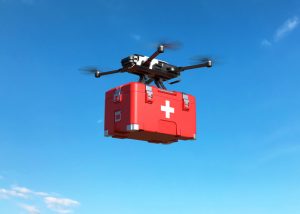
Merck & Co. has partnered with Volansi to test delivering cold chain products from a North Carolina manufacturing facility to a nearby health clinic.
The ‘pilot’ scheme sees Merck (known as MSD outside of North America) use Volansi’s VOLY C10 drone to deliver vaccines and medicinal products from its facility in Wilson, North Carolina to Vidant Healthplex-Wilson, a Vidant Health clinic about two miles away.
“This project is starting with Merck’s vaccines against measles, mumps, rubella, chickenpox, pneumonia, and hepatitis,” a Volansi spokesperson told Bioprocess Insider, though added the VOLY C10 – which has a flight endurance of up to 60 minutes and a distance range of up to 50 miles – is not limited to carrying only these vaccines.

Image: iStock/sarawuth702
“Our VOLY C10 was designed specifically to deliver this type of critical and urgent cargo. The VOLY C10 doesn’t drop the cargo via parachute or lower by rope, as this would be far too risky. Instead, the VOLY C10 lands like a helicopter at the delivery location, at which point the cargo is automatically released by a ‘soft touch’ system.”
The use of drones is the latest innovation in the cold-chain logistics space, but according to Volansi it is less risky than other transportation methods since the delivery is made immediately upon receiving the shipment and taken directly to the delivery point, as opposed to being sent to a centralized distribution center and then onward via a secondary form of transport.
However, such technology remains far from turning the complex pharma logistics industry on its head for now.
“As with all our projects, we are taking a crawl, walk, run approach to these deliveries. For example, we are currently operating our VOLY C10 VTOL, which has a 10-pound load capacity,” we were told.
“However, in the future, we could scale up to larger aircraft, such as our VOLY C20, which has a larger load capacity. However, for this to happen, the US must first open its national airspace more widely to drone flights. Once we have the right regulations in place, we could potentially deliver hundreds of pounds or more on a daily basis and to multiple locations far and wide.”
In a statement, Craig Kennedy, SVP of Global Supply Chain Management at Merck said: “Merck is very supportive of collaborations using new technologies to explore how one day we could help better serve the healthcare community. Our existing distribution system is strong, and this pilot helps us explore new innovative delivery options that would complement our existing supply chain capabilities.”
About the Author
You May Also Like

schedl_b_and_w.jpg?width=100&auto=webp&quality=80&disable=upscale)
schedl_b_and_w.jpg?width=400&auto=webp&quality=80&disable=upscale)



